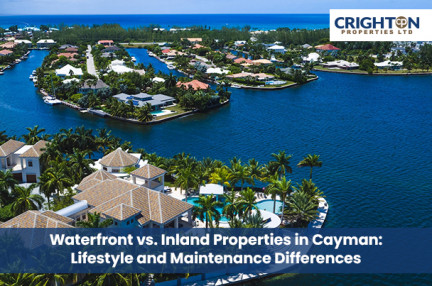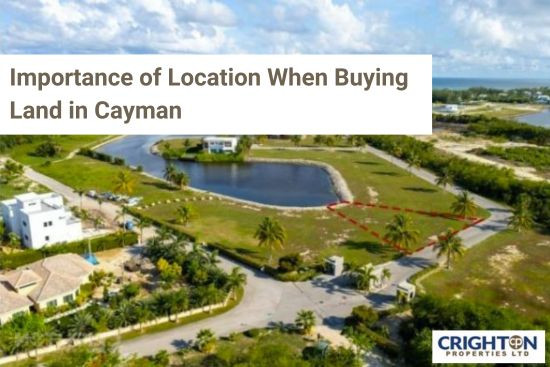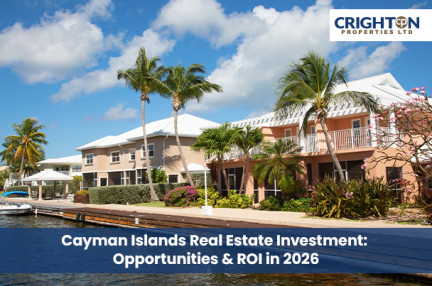When it comes to purchasing undeveloped land in the Cayman Islands, the location might make all the difference. With the islands distinct development opportunities, understanding why location matters is the first step toward ensuring that your investment matches with your objectives.
Whether you're planning a personal retreat, commercial property, or agricultural development, the ideal site will influence everything from zoning regulations to future resale value.
Why Location is Crucial for Land Purchases?
Zoning and Development Potential
Distinct locations in Cayman have distinct zoning rules that control how land can be utilized, such as residential, commercial, agricultural, or mixed use. Choosing a location with appropriate zoning rules ensures that your property can be built according to your specifications.
Accessibility and Infrastructure
The availability of services like water, electricity, and roads varies by region. Land in isolated or underdeveloped places may lack quick access to infrastructure, thereby raising the cost and time required for the development of Cayman Islands land for sale.
Resale Value and Appreciation
Location heavily influences the future value of land. Land in high-demand areas, like waterfront or tourism-focused regions, generally appreciates more quickly and can attract higher resale prices.
Environmental and climate considerations
Some sections of Cayman are particularly vulnerable to natural disasters, such as floods or hurricane damage. Coastal and low-lying areas may necessitate additional measures to preserve land stability and environmental resilience, increasing development costs.
Closeness to Amenities and Conveniences
Although the site is undeveloped, its closeness to schools, healthcare, shopping malls, and recreational amenities will influence its long-term value and resale potential. Land closer to these attractions frequently attracts greater prices and faster appreciation.
Future Growth and Community growth
The Cayman Islands have room for future growth and infrastructural developments. Purchasing land in a burgeoning or emerging location might provide substantial appreciation as the neighborhood grows.
Privacy and Surrounding Land Use
The surroundings of undeveloped land impact its potential for both privacy and future development. For instance, land in quieter residential locations offers more privacy, while land near commercial zones may bring greater future value but less seclusion.
Natural Disaster Preparedness
Locations prone to specific environmental risks, such as hurricanes or high tidal surges, may require additional disaster-preparedness measures. Understanding local disaster risks by location helps plan appropriate construction measures, which may impact overall project costs.
Landmark Proximity and Tourism Appeal
Being near popular landmarks, attractions, or tourist zones can increase the value of land, especially if it’s intended for commercial use, such as vacation rentals or resorts. This makes the land more appealing for tourism-related projects with high earning potential.
Community Development Plans
Some areas may have government-backed plans for future development, such as new schools, healthcare facilities, or commercial zones. Land in areas slated for growth can offer better long-term appreciation and attract buyers or investors looking for developing communities.
Local Economy and Employment Hubs
Proximity to business districts or employment centers can make land more attractive for residential developments aimed at working professionals. Land in or near employment hubs offers stronger demand for housing or rental properties, adding to its investment potential.
Land Parcel Size and Expansion Opportunities
Depending on the location, some areas may offer the opportunity to buy larger parcels or multiple adjacent lots. This can benefit buyers interested in larger-scale projects, future expansion, or subdividing the land for additional profit.
Natural Resources and Soil Quality
Some land locations offer resources such as fertile soil or fresh groundwater sources, which can be valuable for agricultural projects or eco-friendly developments. Land with natural resource advantages can reduce costs and enhance the appeal of specific types of developments.
Proximity to Ports and Transportation Links
Commercial land near ports or other transportation links benefits logistics and trade. Proximity to these amenities can save transportation costs and enhance accessibility for enterprises, making the site appealing to commercial or industrial buyers.
Community and Environmental Sustainability Activities
Some Cayman Islands focus on environmentally conscious developments or sustainable community activities. Land in these areas may provide additional incentives for eco-friendly building approaches, attracting environmentally aware purchasers and investors.
Market Demand and Buyer Preferences by Location
Some areas in Cayman are traditionally preferred by expatriates, retirees, or specific demographics. Choosing land in a location with high demand among your target audience ensures a better return on investment and makes it easier to attract buyers in the future.
By considering these factors and consulting with a trusted Cayman Real Estate Company, you can better understand the location's diverse impacts on undeveloped land in Cayman. This will allow you to make a well-informed investment aligned with your personal and financial goals.
Conclusion
The location of undeveloped land in Cayman is essential for determining its development potential, future value, and suitability for your goals.
So, carefully considering these factors before buying the Cayman Islands land for sale will help ensure a wise investment that aligns with your plans.




